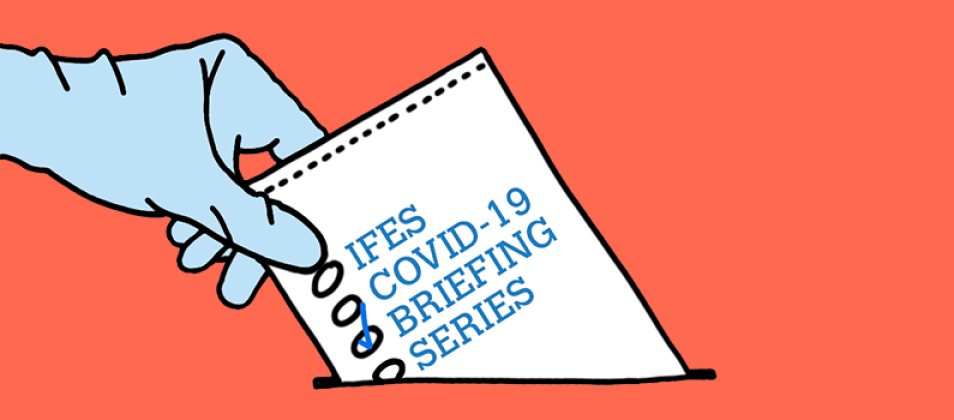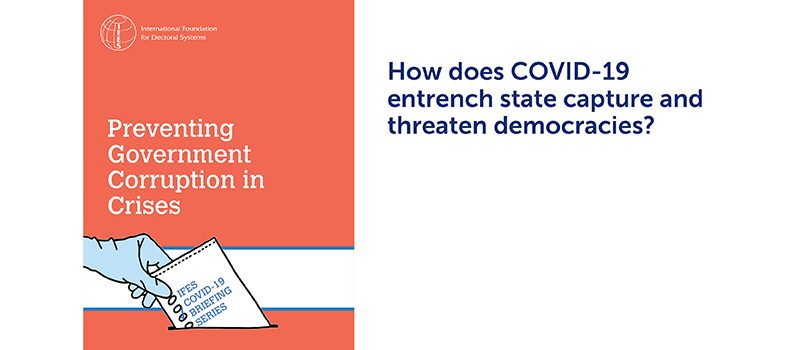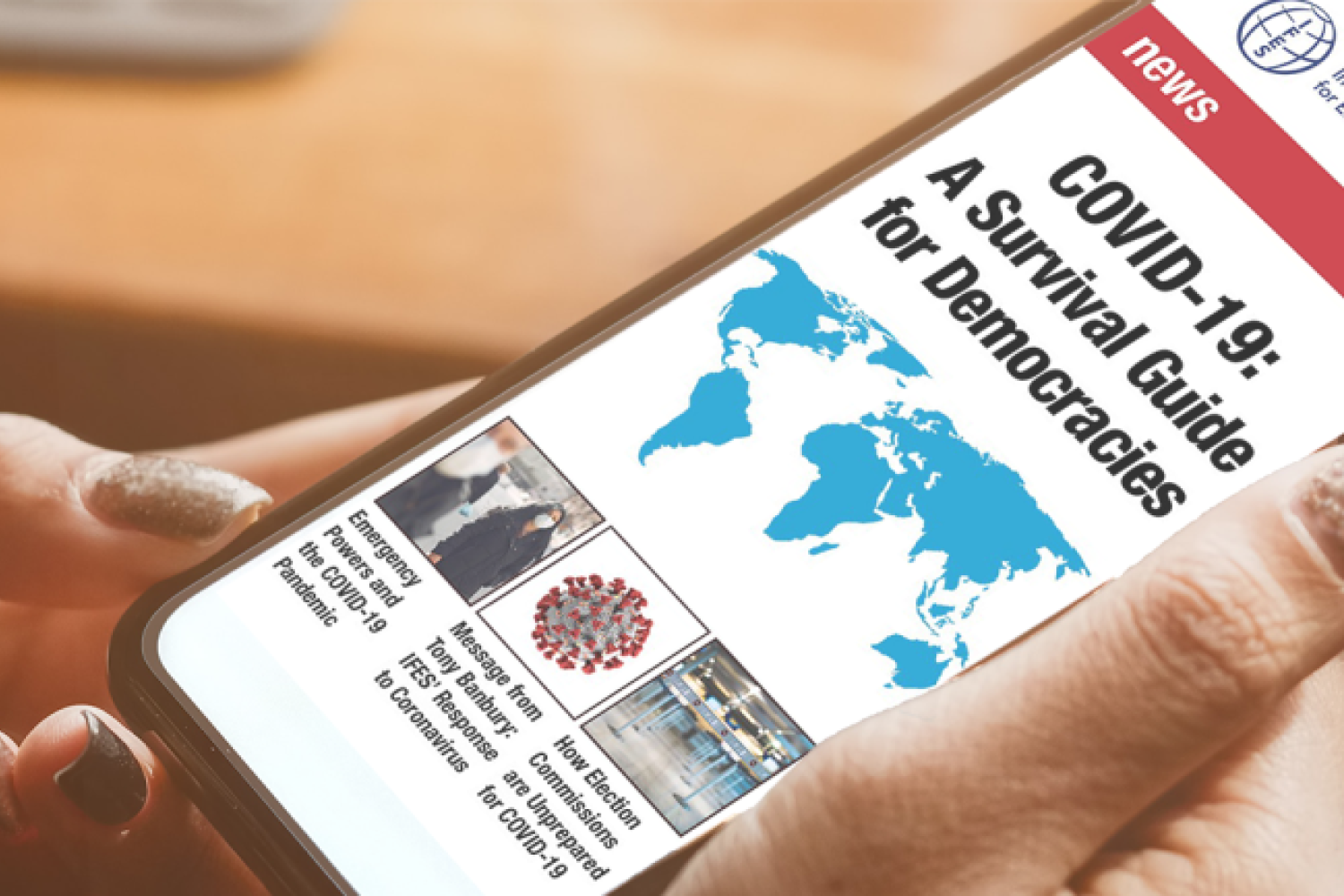
IFES COVID-19 Briefing Series: Preventing Government Corruption in Crises
How does COVID-19 entrench state capture and threaten democracies?
Preventing Government Corruption in Crises, the fifth paper in the International Foundation for Electoral Systems’ (IFES) COVID-19 Briefing Series, looks closely at this question and offers guidance for democracy and governance practitioners, policymakers and supporters.
Corruption undermines the efficiency and efficacy of government, which, in the short term, can derail the response to a public emergency. It also drives distrust in democratic institutions, including legislatures, executive agencies and courts. As a result, corruption by bad actors in public office – whether for personal or political gain – has the potential to damage the credibility and integrity of governments long after the immediate crisis has passed. The long-term ill effects of political corruption must not be ignored, given the potential for state capture and the entrenchment of incumbent regimes. This risk is especially concerning as many elections have been postponed and modified as a result of the health crisis, subverting the ultimate accountability measure for governments.
The unprecedented volume of funds being deployed to address the COVID-19 crisis and bolster economies creates new opportunities for exploitation and undermining of accountability mechanisms in several key areas, including:
- Public Procurement: The COVID-19 pandemic necessitates the purchase of medical supplies and personal protective gear that are in high demand and short supply without the usual competition and oversight protections.
- Government Relief Programs: The scope and urgency of relief programs and weakened accountability mechanisms have increased opportunities for abuse by public officials.
- Political Finance and Use of State Resources: The pandemic creates opportunities to violate political finance laws, misuse public resources and makes these abuses harder to detect.
- The Judiciary: Public health measures have profoundly impacted the operational capacity of judiciaries, increasing the opportunity for the executive to bypass court oversight and undermine independence. At the same time, public health measures are in some cases increasing judicial discretion, creating opportunities for corruption within the judiciary.
Recommendations
Policymakers and legislators should:
- Ensure that crisis response and recovery programs require clear and transparent public reporting. Where possible, proactive disclosure should be pursued rather than relying on access to information requests.
- Reduce the amount of discretion available to individuals by establishing clear and transparent criteria for decision-making.
- Ensure that effective oversight is built into emergency responses.
- Proactively communicate with the public regarding the source of funds used for emergency response efforts and relief programs.
- Ensure that emergency procedures that bypass or simplify oversight measures are temporary and that standard procedures are reintroduced as soon as appropriate.
Agencies and officers responsible for implementing COVID-19 response efforts should:
- Maintain clear and accurate documentation and disclosure requirements.
- Clearly and promptly identify individuals responsible for key decisions and essential emergency response and recovery processes.
- Engage with oversight institutions and law enforcement to identify and mitigate corruption risks and investigate potential instances of corrupt conduct.
- Monitor emergency programs against preestablished indicators and report regularly.
- Continually respond to public requests for information.
Civil society and journalists should:
- Leverage available, verifiable information to monitor and report on the government’s emergency response. Collaborate and share information across civil society organizations and networks.
- Engage in public awareness campaigns and surveys to sensitize the public to existing corruption risks and to monitor whether emergency spending has reached intended beneficiaries or been used for clear political purposes.
- Identify gaps in available information and advocate for improved transparency or data collection processes or procedures.
- Investigate suspected corrupt conduct by public officials and seek criminal, civil or administrative penalties where appropriate.
The judiciary should:
- Reduce the level of individual judges’ discretion where possible by ensuring that court procedures are clear and transparent.
- Ensure that proceedings allow appropriate levels of transparency and public access.
- Continue operating public complaint mechanisms and inform the public of how to report judicial misconduct.
Read and download Preventing Government Corruption in Crises.
Find the other papers in the IFES COVID-19 Briefing Series, which tackles fundamental areas of concern for democracy and governance in the wake of the pandemic.
Learn more at IFES’ COVID-19 Survival Guide for Democracies.
Follow #COVIDxDemocracy for new analysis and innovative solutions during the pandemic.
Contact [email protected] for more information.
IFES COVID-19 Briefing Series: Preventing Government Corruption in Crises
Authors: Katherine Ellena, Senior Global Legal Advisor; Alexandra Brown, Legal and Research Officer; Chelsea Dreher, Research Officer
Lead Editor: Erica Shein, Director, Center for Applied Research and Learning
Editors: Chad Vickery, Vice President, Global Strategy and Technical Leadership; Angela Canterbury, Director, Strategic Communications and Advocacy














